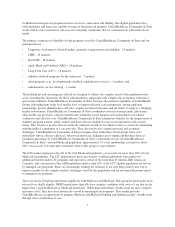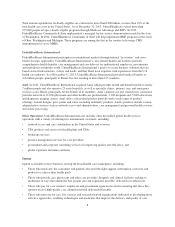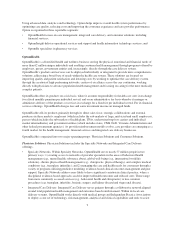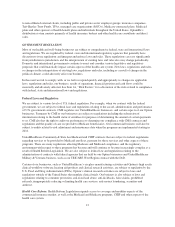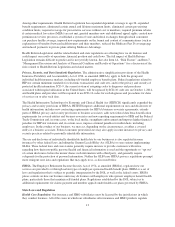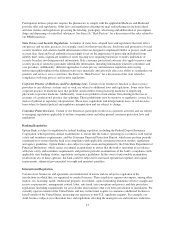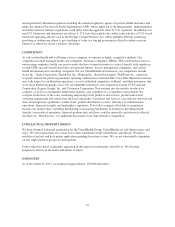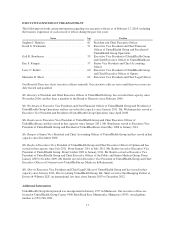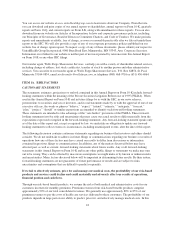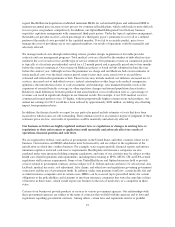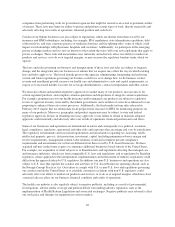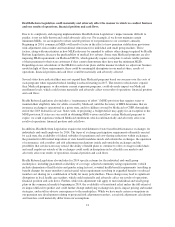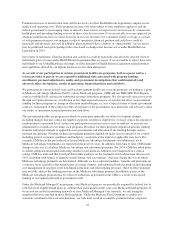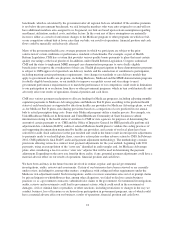United Healthcare 2013 Annual Report Download - page 17
Download and view the complete annual report
Please find page 17 of the 2013 United Healthcare annual report below. You can navigate through the pages in the report by either clicking on the pages listed below, or by using the keyword search tool below to find specific information within the annual report.Participation in these programs requires the pharmacies to comply with the applicable Medicare and Medicaid
provider rules and regulations. Other laws and regulations affecting our mail order pharmacies include federal
and state statutes and regulations governing the labeling, packaging, advertising and adulteration of prescription
drugs and dispensing of controlled substances. See Item 1A, “Risk Factors” for a discussion of the risks related to
our PBM businesses.
State Privacy and Security Regulations. A number of states have adopted laws and regulations that may affect
our privacy and security practices, for example, state laws that govern the use, disclosure and protection of social
security numbers and sensitive health information or that are designed to implement GLBA or protect credit card
account data. State and local authorities increasingly focus on the importance of protecting individuals from
identity theft, with a significant number of states enacting laws requiring businesses to notify individuals of
security breaches involving personal information. State consumer protection laws may also apply to privacy and
security practices related to personally identifiable information, including information related to consumers and
care providers. Additionally, different approaches to state privacy and insurance regulation and varying
enforcement philosophies in the different states may materially and adversely affect our ability to standardize our
products and services across state lines. See Item 1A, “Risk Factors” for a discussion of the risks related to
compliance with state privacy and security regulations.
Corporate Practice of Medicine and Fee-Splitting Laws. Certain of our businesses function as direct service
providers to care delivery systems and, as such, are subject to additional laws and regulations. Some states have
corporate practice of medicine laws that prohibit certain entities from practicing medicine or employing
physicians to practice medicine. Additionally, some states prohibit certain entities from sharing in the fees or
revenues of a professional practice (fee-splitting). These prohibitions may be statutory or regulatory, or may be a
matter of judicial or regulatory interpretation. These laws, regulations and interpretations have, in certain states,
been subject to limited judicial and regulatory interpretation and are subject to change.
Consumer Protection Laws. Certain of our businesses participate in direct-to-consumer activities and are subject
to emerging regulations applicable to on-line communications and other general consumer protection laws and
regulations.
Banking Regulation
Optum Bank is subject to regulation by federal banking regulators, including the Federal Deposit Insurance
Corporation, which performs annual examinations to ensure that the bank is operating in accordance with federal
safety and soundness requirements, and the Consumer Financial Protection Bureau, which may perform periodic
examinations to ensure that the bank is in compliance with applicable consumer protection statutes, regulations
and agency guidelines. Optum Bank is also subject to supervision and regulation by the Utah State Department of
Financial Institutions, which carries out annual examinations to ensure that the bank is operating in accordance
with state safety and soundness requirements and performs periodic examinations of the bank’s compliance with
applicable state banking statutes, regulations and agency guidelines. In the event of unfavorable examination
results from any of these agencies, the bank could be subjected to increased operational expenses and capital
requirements, enhanced governmental oversight and monetary penalties.
International Regulation
Certain of our businesses and operations are international in nature and are subject to regulation in the
jurisdictions in which they are organized or conduct business. These regulatory regimes encompass, among other
matters, tax, licensing, tariffs, intellectual property, investment, capital (including minimum solvency margin and
reserve requirements), management control, labor, anti-fraud, anti-corruption and privacy and data protection
regulations (including requirements for cross-border data transfers) that vary from jurisdiction to jurisdiction. We
currently operate outside of the United States and may in the future acquire or commence additional businesses
based outside of the United States, increasing our exposure to non-U.S. regulatory regimes. For example, our
Amil business subjects us to Brazilian laws and regulations affecting the managed care and insurance industries
15




